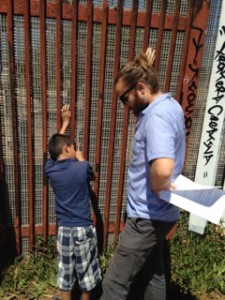 A couple weeks ago, Mexican and USAmerican leaders gathered at Friendship Park – the wall between us – representing millions of Christians throughout Mexico and the United States by offering a prayer on behalf of the 60,000 unaccompanied minors detained on our border. As I stood in this sacred prayer circle that extended across our shared border, I thought,“This is what the Church looks like when it takes seriously it’s call to care for the ‘least of these’ as part of our citizenship to a kingdom that knows no borders.”
A couple weeks ago, Mexican and USAmerican leaders gathered at Friendship Park – the wall between us – representing millions of Christians throughout Mexico and the United States by offering a prayer on behalf of the 60,000 unaccompanied minors detained on our border. As I stood in this sacred prayer circle that extended across our shared border, I thought,“This is what the Church looks like when it takes seriously it’s call to care for the ‘least of these’ as part of our citizenship to a kingdom that knows no borders.”
While some Christian’s view the arrival of these children (many of whom are fleeing actual or pending violence) as a burdensome imposition – welcoming these kids with protests and hate speech – others are rightly viewing this an opportunity for the Church to be the Church and reflect Good News to some of the worlds most vulnerable. These kids can’t be viewed as a threat to our abundance, but the very people we are to care for out of our abundance.
Thankfully, I have had scores of folks in the Church asking what can be done. Another way it has been asked is, “How can we welcome the children in the same way Jesus did?”
Here are three tangible ways:
1. Seek to Understand the Human Plight
Few understand the gravity of the situation these kids are fleeing from. Whether physical starvation, hopeless depression, violent war or a gang reality, these kids are traumatized before they ever begin their journey to the United States. It is in that place that they begin one of the most dangerous journey’s imaginable from Central America to the United States. The vast majority of the girls who make the journey are either killed, raped or sold into sex slavery, while the percentage of boys who experience similar horrors isn’t much lower. With this in mind, imagine how they feel when they finally make it into the United States! While 60,000 have made it, scores of others haven’t. These kids need attention and care, so when we welcome them with hatred and signs to “GO HOME,” I can’t imagine how that adds to their trauma. Further, I can’t imagine that’s how Jesus’ would have his Church treat the strangers and children among us.
READ: Enrique’s Journey
WATCH: Which Way Home
2. Meet Those Behind the Headlines
This is not an issue to remain in the walls of political power or on the mouths of political pundits filling our news outlets. Because this is a humanitarian issue, we must meet the humans behind the headlines and debates. There are detention centers and shelters in cities all across the United States where these kids are being held as their future hangs in the balance. Go and meet these kids. Play soccer. Share a meal. Hear their story.
Just a few weeks ago, we (TGIP) brought of a group of US teenagers to a shelter here in San Diego to spend time with these teenagers from Central America. While it took a few minutes to break the awkward “hello’s,” these kids bonded as equals. They were no different from one another, they just had dramatically different stories. After hours of soccer, games and sharing tables, the common humanity was all any of us could see.
GO: Southwest Key is the largest network of shelters in the United States and are located in multiple states. Also, you don’t have to search long to identify a detention center in your city.
3. Act According to Your Convictions
Having gained both an academic and experiential understanding of this crisis, there are plenty of ways to take action. Here are a few suggestions for you and/or your community:
- Foster/Adopt: There are now organizations and ministries facilitating the foster and/or adoption process of these kids. This is a VERY tangible way for the Church to be the Church. Imagine if we weren’t waiting for the government to care for these kids, but taking action ourselves to solve this crisis by opening our doors and hearts?
- Donate: Search organizations who are caring for these kids and offer your finances or material resources.
- Advocate: Call your representative and tell them the Church supports the care of these children and that this crisis must be viewed as a humanitarian crisis politically.
- Educate: Invite those closest to you and the leadership within your Church to academically and experientially educate themselves on this issue. Offer them tangible steps towards redemptive engagement.
In the way that Jesus opened his arms to children when those in power told him to do otherwise, may the Church open its arms to the children on our doorstep who are so desperately in need of love, dignity, healing and hope.